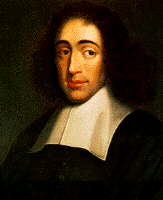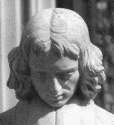Philosophy Pages
| Dictionary | Study Guide | Logic | F A Q s | ||
|---|---|---|---|---|---|---|
| History | Timeline | Philosophers | Locke | |||
Philosophy Pages
| Dictionary | Study Guide | Logic | F A Q s | ||
|---|---|---|---|---|---|---|
| History | Timeline | Philosophers | Locke | |||

|
Life and Works . . Method . . Metaphysics . . God / Nature . . Mind and Body . . Human Nature . . Epistemology . . Freedom Bibliography Internet Sources |
Baruch Spinoza was born to Portuguese Jews living in exile in Holland, but his life among the Marranos there was often unsettled. Despite an early rabbinical education, he was expelled from the synagogue at Amsterdam for defending heretical opinions in 1656. While engaging privately in serious study of medieval Jewish thought, Cartesian philosophy, and the new science at Rijnburg and the Hague, Spinoza supported himself by grinding optical lenses, an occupation that probably contributed to the consumption that killed him. Private circulation of his philosophical treatises soon earned him a significant reputation throughout Europe, but Spinoza so treasured his intellectual independence that in 1673 he declined the opportunity to teach at Heidelberg, preferring to continue his endeavors alone.
Spinoza's first published work was a systematic presentation of the philosophy of Descartes, to which he added his own suggestions for its improvement. The Principles of Descartes's Philosophy (1663) contain many of the characteristic elements of his later work, but Spinoza seems to have realized that a full exposition of his own philosophical views would require many years of devoted reflection. In the meantime, he turned his attention briefly to other issues of personal and social importance. The Tractatus Theologico-Politicus (A Theologico-Political Treatise) (1670) is an examination of superficial popular religion and a vigorous critique of the miltant Protestantism practiced by Holland's ruling House of Orange. Spinoza disavowed anthropomorphic conceptions of god as both logically and theologically unsound, proposed modern historical-critical methods for biblical interpretation, and defended political toleration of alternative religious practices. Christians and Jews, he argued, could live peaceably together provided that they rose above the petty theological and cultural controversies that divided them.
Although he published nothing else during his lifetime,
metaphysical speculations continued to dominate Spinoza's philosophical reflections, and he struggled to find an appropriate way to present his rationalistic conviction that the universe is a unitary whole.
 Respect for deductive reasoning and for the precision of the Latin language led Spinoza to express his
philosophy in a geometrical form patterned on that empolyed in Euclid's Elements.
Thus, each of the five books of Spinoza's Ethica Ordine Geometrico Demonstrata
(Ethics) (1677) comprises a sequence of significant propositions, each of which is deduced from those that have come before, leading back to a small set of self-evident definitions and axioms.
Respect for deductive reasoning and for the precision of the Latin language led Spinoza to express his
philosophy in a geometrical form patterned on that empolyed in Euclid's Elements.
Thus, each of the five books of Spinoza's Ethica Ordine Geometrico Demonstrata
(Ethics) (1677) comprises a sequence of significant propositions, each of which is deduced from those that have come before, leading back to a small set of self-evident definitions and axioms.
In Book I Spinoza claimed to demonstrate both the necessary existence and the unitary nature of the unique, single substance that comprises all of reality. Spinoza preferred the designation "Deus sive Natura" ("god or nature") as the most fitting name for this being, and he argued that the its infinite attributes account for every feature of the universe. Book II describes the absolute necessity with which the two attributes best known to us, thought and extension, unfold in the parallel structure that we, with our dual natures, comprehend as the ideas and things with which we are acquainted in ordinary life. This account also provides for the possibility of genuine human knowledge, which must be based ultimately on the coordination of these diverse realms. Spinoza's Tractatus de Intellectus Emendatione (On the Improvement of the Understanding) (1677) provides additional guidance on the epistemological consequences of his metaphysical convictions. Here Spinoza proposed a "practical" method for achieving the best knowledge of which human thinkers are capable.
Spinoza applied similar principles to human desires and agency in Books III-V of the Ethics, recommending a way of life that acknowledges and appropriates the fundamental consequences of our position in the world as mere modes of the one true being. It would be moral bondage if we were motivated only by causes of which we remain unaware, Spinoza held, so genuine freedom comes only with knowledge of what it is that necessitates our actions. Recognizing the invariable influence of desire over our passionate natures, we then strive for the peace of mind that comes through an impartial attachment to reason. Although such an attitude is not easy to maintain, Spinoza concluded that "All noble things are as difficult as they are rare."
|
Recommended Reading:
Primary sources:
Secondary sources:
Additional on-line information about Spinoza includes:
|
